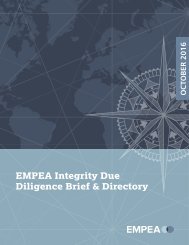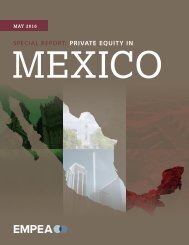Create successful ePaper yourself
Turn your PDF publications into a flip-book with our unique Google optimized e-Paper software.
INTRODUCTION<br />
Across the emerging markets, private companies face<br />
two persistent growth constraints: expansion capital and<br />
expertise. 1 Frequently, small and mid-size businesses are<br />
unable to secure bank lending to finance their aspirations<br />
for growth, particularly if they lack hard assets that can<br />
serve as collateral. Local banks <strong>of</strong>ten tend to prefer vanilla,<br />
asset-based—and frequently short-term—lending, and shy<br />
away from cash flow-based lending, let alone more exotic<br />
structures. Moreover, for the most part, local capital markets<br />
remain out <strong>of</strong> reach for all but the largest emerging market<br />
companies.<br />
In addition to the financing gap, companies frequently face<br />
an expertise, or human capital, gap. Whether it’s corporate<br />
governance, financial management or operations, there<br />
are <strong>of</strong>ten many international standards and efficiencies<br />
that can be implemented to enhance an emerging market<br />
company’s enterprise value. These two constraints <strong>of</strong><br />
financial and human capital are particularly evident in Sub-<br />
Saharan Africa, the focus <strong>of</strong> this report.<br />
Private equity is uniquely suited to fill these gaps. On the one<br />
hand, private equity fund managers are a source <strong>of</strong> longterm,<br />
patient capital that can help to finance a company’s<br />
growth. On the other, private equity fund managers can take<br />
companies to their next level <strong>of</strong> development by instilling<br />
management expertise, inculcating global best practices,<br />
and leveraging experience and networks to help companies<br />
achieve scale—either organically or through acquisitions.<br />
Indeed, private equity fund managers are incentivised to<br />
work closely with entrepreneurs and company management<br />
teams to create value—it is how they make money.<br />
OVERVIEW OF PRIVATE EQUITY FUND<br />
STRUCTURING AND CONSIDERATIONS<br />
Private equity funds are typically structured as limited<br />
partnerships, wherein the fund sponsor (the private equity<br />
fund manager, or general partner (GP)) raises capital<br />
from qualified investors (limited partners or LPs) for a<br />
pooled fund, whose capital the GP then invests in portfolio<br />
companies. 2 The LPs retain limited liability (meaning their<br />
financial liability is limited only to the amount that they<br />
have committed to the fund), whilst the GP, which retains<br />
decision-making authority, faces unlimited liability.<br />
Many African private equity funds, however, are not<br />
structured as limited partnerships but as companies due to<br />
the popularity <strong>of</strong> Mauritius corporate structures for funds.<br />
Whilst there are significant differences between limited<br />
partnerships and corporate structures, the commercial<br />
terms for both tend to be similar.<br />
The prevailing wisdom is that taxation and a credible legal<br />
and regulatory regime are the key drivers that LPs, GPs and<br />
their advisors contemplate when structuring a fund, along<br />
with limited liability for investors. In broad terms, there are<br />
three levels—the fund level, above the fund, and below the<br />
fund—that come into consideration.<br />
−<br />
The fund level – fund vehicles are usually located<br />
in a jurisdiction that enables a limited partnership<br />
structure. The fund itself typically operates as a passthrough<br />
vehicle, and is <strong>of</strong>ten located in what the GP<br />
views as a tax-efficient jurisdiction so that there is<br />
minimal leakage <strong>of</strong> cash flows among the LPs, the fund<br />
and the underlying portfolio companies. In addition,<br />
the fund domicile may have investment and / or tax<br />
treaty networks with the market(s) the GP is targeting<br />
for deals, providing favourable tax treatment and<br />
enhanced legal protections. As noted above, corporate<br />
structures may be preferred in some jurisdictions,<br />
such as Mauritius.<br />
1<br />
For more on this topic, see Roger Leeds, Private Equity Investing in Emerging Markets (Palgrave Macmillan: 2015).<br />
2<br />
The content for this section is drawn from a Debevoise & Plimpton presentation, “Legal Strategies: Protecting GP Interests and Maintaining Competitive<br />
and Marketable Positioning to LPs,” delivered at EMPEA’s Fundraising Masterclass, held in Washington, DC on 14 May 2015. The information presented<br />
in this section should not be construed as legal, tax, investment or other advice.<br />
<strong>Conduits</strong> <strong>of</strong> <strong>Capital</strong> – Onshore Financial Centres and Their Relevance to African Private Equity<br />
| 15





